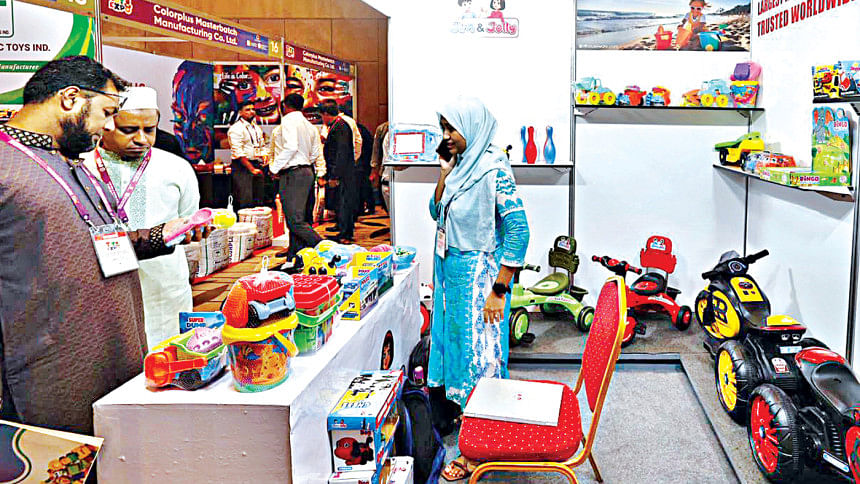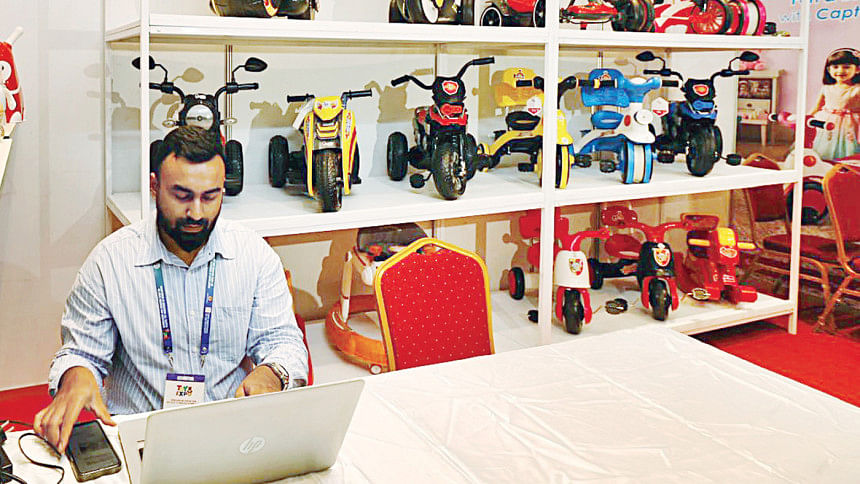Toy industry: From import reliance to export growth

In the heart of Dhaka, amid vibrant toy displays and the hum of industry conversations at InterContinental Dhaka, sector people were talking about a quiet revolution — one that could redefine Bangladesh's export landscape and lessen its long-standing reliance on imported toys.
The three-day Toy Show 2025, which kicked off yesterday, is an exhibition jointly organised by the Bangladesh Plastic Goods Manufacturers and Exporters Association (BPGMEA), the Ministry of Commerce, and the government's Export Competitiveness for Jobs (EC4J) Project.
But beyond the cheerful toys and glossy stalls lies a deeper industrial vision.
Shamim Ahmed, president of the BPGMEA, summed it up aptly, "We are not just producing toys -- we are rewriting Bangladesh's industrial narrative."
For decades, Bangladesh's plastic industry was viewed as a low-value, low-tech sector made up of small factories churning out household items or packaging materials. But that perception is rapidly changing.
According to Ahmed, even seasoned readymade garment (RMG) exporters are diversifying into plastic, eyeing a sector where innovation, employment, and export potential are growing.

"This is no longer a cottage industry. We're building an ecosystem, from resin production to advanced moulding, geared for global markets," he said.
Indeed, the numbers speak volumes. The domestic plastic toy market is already worth Tk 12,000 crore. Over 300,000 people are directly and indirectly employed in the sector, supported by more than 152 factories scattered across the country.
As for exports, in FY17, plastic exports stood at a modest $15.3 million. Fast-forward to FY23 and that figure had skyrocketed to $77 million, a nearly fivefold increase in just six years.
This annual growth trend of around 24 percent indicates the sector's resilience and potential, Ahmed added.
At the centre of this growth story is the toy industry. Once a niche segment, it is now emerging as a strategic export driver.
Over 40 local manufacturers are exhibiting products at the three-day Toy Show 2025 that began yesterday. The major players at the show include Sonic (Bangladesh) Ltd, Zihan Plastic Industries, RFL Group, and ACI Premio Plastics.
Sonic (Bangladesh), an export-oriented toy manufacturer established in the Export Processing Zone at Nilphamari, some 350 kilometres northwest of capital Dhaka, exported toys worth around $43 million last fiscal year alone.
Md Robiul Alam, an administrative officer of the company, proudly shared that their workforce of 10,000 workers, mostly female, was poised to grow further, with plans to set up three new factories in Dinajpur, creating 20,000 more jobs.
Zihan Plastic Industries, based in Keraniganj on the outskirts of Dhaka, produces 220 toy items and is eyeing significant export expansion.
According to SM Nahidul Islam, general manager of the company, their export revenue jumped from $100,000 last year to a projected $250,000 this year.
"The domestic market itself is growing at a pace we never imagined," he said.
Kallan Biswas, senior manager (export) of ACI Premio Plastics, echoed similar optimism.
Exporting $1.2 million annually to countries like Saudi Arabia, Bhutan, and India, the company also sells Tk 30 crore worth of toys monthly in the local market.
"We employ over 500 people, 80 percent of whom are women. Toys are light work and our female workers are incredibly efficient," he added. Beyond toys, the broader plastic industry is undergoing a transformative shift from import dependency to domestic production.
"These developments surprise many policymakers," Ahmed noted. "They still think of plastic as low-tech, but the ground reality is different. We're evolving fast," he said.
He also pointed to the Gujarat model in India, where polymer industries became export dynamos. "We can replicate that success, and perhaps even surpass it."
If each of the 152 factories has an average investment of Tk 50 crore, the cumulative investment in this sector already stands at an estimated Tk 7,600 crore.
With newer factories rising in Nilphamari, backed by foreign investment from places like Hong Kong, the horizon is only getting brighter. However, despite the widespread optimism, challenges persist, ranging from infrastructure gaps to regulatory inertia.
Many export-oriented companies, like Sonic, are barred from selling in the domestic market due to policy restrictions.
There's also a need for improved trade facilitation, better port logistics, and incentives for resin production.
Still, stakeholders are hopeful.
With targeted policy support, Ahmed believes Bangladesh can emerge as one of the top three plastic-product-exporting countries globally within the next decade.
For Bangladesh, this isn't just about GDP numbers or trade surpluses. It's about jobs for women in rural factories, about young entrepreneurs seeing opportunity beyond garments, and about building a nation that makes, not just buys.

 For all latest news, follow The Daily Star's Google News channel.
For all latest news, follow The Daily Star's Google News channel. 



Comments